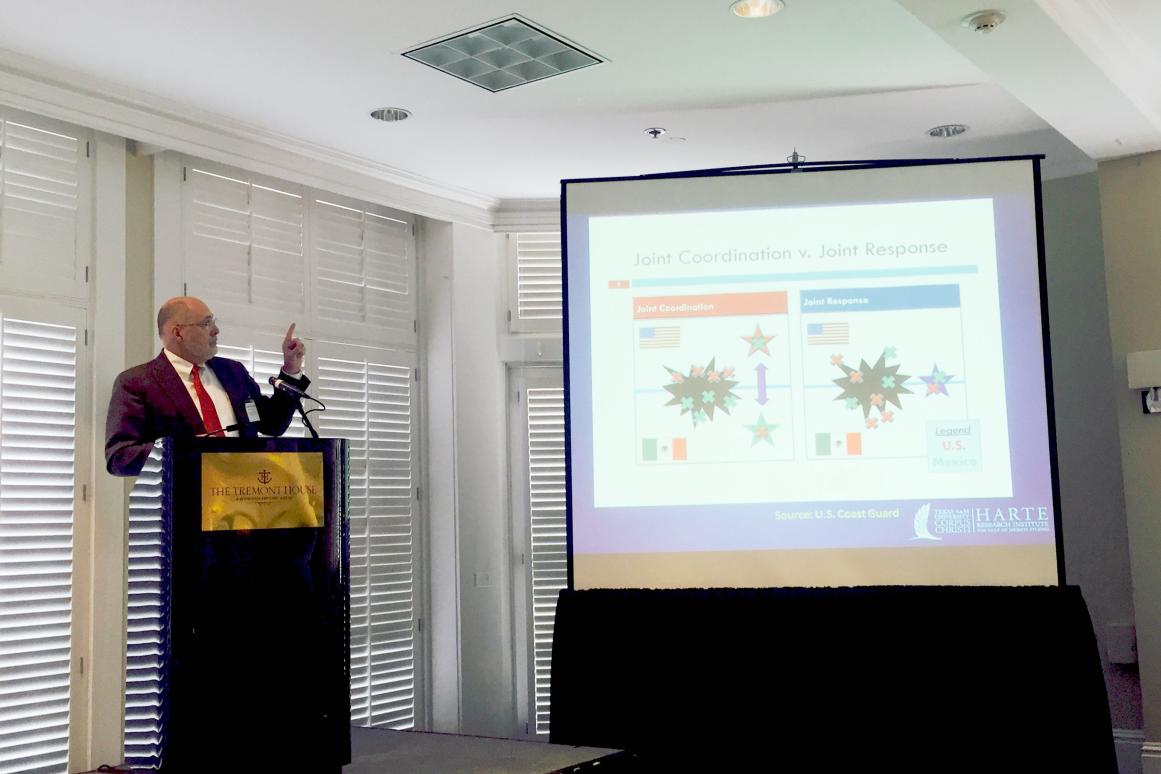HRI Co-hosts Mexican Energy Reform Symposium in Galveston

The Harte Research Institute (HRI) for Gulf of Mexico Studies at Texas A&M University-Corpus Christi co-hosted a symposium on Mexican energy reforms last month, bringing U.S. and Mexican officials together to serve as a catalyst for transboundary cooperation in managing increased offshore energy production in the Gulf of Mexico.
The symposium, entitled “Improving Cooperation for a Sustainable Gulf of Mexico after the 2014 Mexican Energy Reforms,” was held Friday, Feb. 26, and included leading government officials from the key regulatory agencies in Mexico and the United States, academics and industry representatives. In addition to HRI, the symposium was sponsored by the University of Houston Law Center’s Center for U.S. and Mexican Law and the National Sea Grant Law Center.
The symposium was organized by HRI Endowed Chair for Marine Policy and Law Dr. Richard McLaughlin; Guillermo Garcia Sanchez, Affiliate Scholar with the University of Houston Center for U.S. and Mexican Law; Catherine Janasie, Research Council with the National Sea Grant Law Center; and Dr. Stuart Carlton, Healthy Ecosystems Specialist at Texas Sea Grant.
In 2013, after more than 70 years of monopoly by the Mexican-state owned energy company PEMEX, Mexico decided to open oil and gas drilling to new competition. Gulf of Mexico oil and gas exploration has increased as a consequence of these energy reform efforts and continues to move into deeper waters, making it necessary for authorities to explore the legal issues that surround transboundary finds, oil and gas discoveries that straddle the border shared by the U.S. and Mexico. In fact, immediately before the symposium, said McLaughlin, oil and gas finds right along the boundary were announced that could trigger the countries’ transboundary hydrocarbon agreement brokered in 2012, much of which still needs to be clarified.
“There could be safety impacts, environmental impacts and also coastal community impacts. It is not clear how these potential impacts and the economic benefits of increased levels of hydrocarbon development will affect the Gulf of Mexico.” McLaughlin said.
There’s also an obvious need after the Deepwater Horizon explosion and spill for the U.S. and Mexico to share best practices and promote collaboration when dealing with changes in coastal zone management.
McLaughlin said there were two goals in mind for the symposium: The first was to collect a series of articles about transboundary issues for The National Sea Grant Law and Policy Journal. Proceedings from the symposium will be published in the journal later this year. The second was to bring a group of Mexican and U.S. regulators together to begin to discuss the most effective ways to cooperate on improving safety and environmental regulations in anticipation of an expected increase in offshore drilling.
The symposium included welcoming statements from HRI Executive Director Dr. Larry McKinney and discussion panels featuring McLaughlin, HRI Assistant Research Scientist Dr. Victoria C. Ramenzoni; and HRI Research Scientist Dr. Patricia Arceo.
The meeting was a follow up to the “Mexico’s Energy Reform: Opportunities and Challenges for International Engagement in the Gulf of Mexico” conference, held in February 2015, which brought together leading experts from government, industry and academia to discuss Mexico’s energy policy reforms, and the opportunities and challenges it created.
After surveying the participants, McLaughlin said the hope is to convene similar forums in the future.
